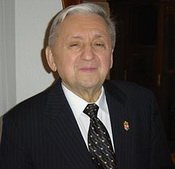(1931-2013)
Sándor Szokolay was born into a musical family of art-lovers in the village of Kunágota in 1931. The years he spent at the Békés-Tarhos Singing School run by the legendary choirmaster and teacher György Gulyás left an indelible impact on him for the rest of his life. This is where he first made the personal acquaintance of Zoltán Kodály, whose spirit greatly influenced his artistic credo. He pursued his advanced studies at the Ferenc Liszt Academy of Music in Budapest, first under the guidance of Ferenc Szabó, and later under Ferenc Farkas. He graduated in 1957, after having already achieved gratifying results in international music composition competitions, and went on to work at Hungarian Radio, and later as a music reader for Hungarian Television. From 1959 until his retirement, he served as a professor of music composition at the Liszt Academy. Over the decades, he served in a series of positions in musical and public life, including as president of the Hungarian Kodály Society and the Hungarian Chamber of Music, as chairman of the board of the Budapest Society of Friends of the Opera and as vice president of the Fészek Artists' Club. He composed a total of nearly 500 works, including seven operas, five ballets, four fairy-tale operas, seven oratorios, three symphonies, 22 cantatas, eight concertos, 14 orchestral pieces, 200 choral works, two string quartets, 40 solo compositions and 120 chamber pieces. His work won him innumerable recognitions, including the Corvin Chain (in 2001), the Ferenc Erkel Award (twice, in 1960 and 1965) and, for his opera Blood Wedding, the Kossuth Prize (in 1966). He was named an Artist of Merit in 1976 and an Artist of Excellence in 1986). He was presented with the Bartók-Pásztory Award twice, in 1987 and 2001, as well as with the Award for Hungarian Art in 1993, the Hungarian Heritage Award in 1998, the Prima Award in 2008 and the Artisjus Award in 2011.
Sándor Szokolay was born into a musical family of art-lovers in the village of Kunágota in 1931. The years he spent at the Békés-Tarhos Singing School run by the legendary choirmaster and teacher György Gulyás left an indelible impact on him for the rest of his life. This is where he first made the personal acquaintance of Zoltán Kodály, whose spirit greatly influenced his artistic credo. He pursued his advanced studies at the Ferenc Liszt Academy of Music in Budapest, first under the guidance of Ferenc Szabó, and later under Ferenc Farkas. He graduated in 1957, after having already achieved gratifying results in international music composition competitions, and went on to work at Hungarian Radio, and later as a music reader for Hungarian Television. From 1959 until his retirement, he served as a professor of music composition at the Liszt Academy. Over the decades, he served in a series of positions in musical and public life, including as president of the Hungarian Kodály Society and the Hungarian Chamber of Music, as chairman of the board of the Budapest Society of Friends of the Opera and as vice president of the Fészek Artists' Club. He composed a total of nearly 500 works, including seven operas, five ballets, four fairy-tale operas, seven oratorios, three symphonies, 22 cantatas, eight concertos, 14 orchestral pieces, 200 choral works, two string quartets, 40 solo compositions and 120 chamber pieces. His work won him innumerable recognitions, including the Corvin Chain (in 2001), the Ferenc Erkel Award (twice, in 1960 and 1965) and, for his opera Blood Wedding, the Kossuth Prize (in 1966). He was named an Artist of Merit in 1976 and an Artist of Excellence in 1986). He was presented with the Bartók-Pásztory Award twice, in 1987 and 2001, as well as with the Award for Hungarian Art in 1993, the Hungarian Heritage Award in 1998, the Prima Award in 2008 and the Artisjus Award in 2011.
